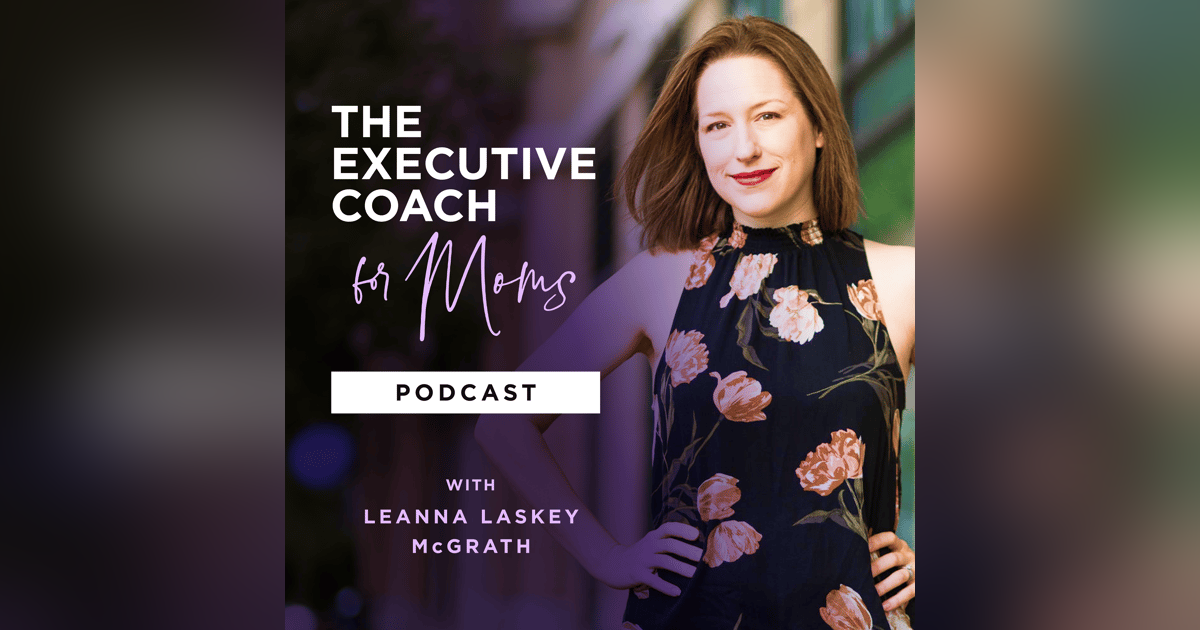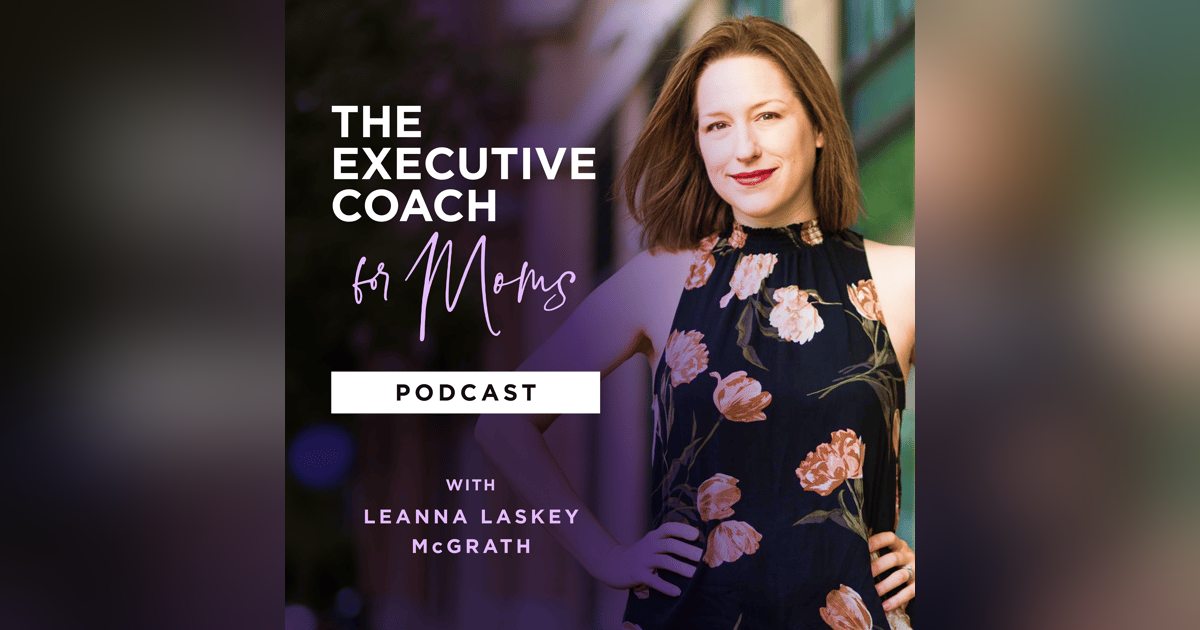Mom Guilt


Delve into the pervasive issue of "mom guilt" with Leanna. She explores the root causes of this guilt, especially for high-achieving moms who often struggle to meet the same high standards at home as they do at work. She offers insight into how societal expectations, perfectionism, and the ever-evolving challenges of parenting contribute to these feelings. Leanna also shares practical strategies for redefining personal expectations, shedding light on the reality at hand, and finding balance.
Full transcript available here.
Connect with Leanna here.
Join Leanna and other moms like you in The Mom Guilt Webinar: Back to School Edition by signing up at coachleanna.com!
Leanna Laskey McGrath 0:08
Welcome to the executive coach for moms podcast, where we support women who are attempting to find balance and joy while simultaneously leading people at work and at home. I'm your host. Leanna Laskey McGrath, former tech exec turned full time mom, recovering perfectionist and workaholic and certified executive coach.
Leanna Laskey McGrath 0:29
Hi everyone. Welcome back to the show. Thanks so much for being here this week. It is the end of August, which kind of marks the end of summer in my mind, and we're heading into a new season. It's back to school time. It's coming up on fall, and it's exciting times. But my guess is that no matter what time of year it is, we are all feeling some level of mom guilt, because that's something we all feel. It's so universal, that's why there's even a term coined mom guilt, and we can all relate to it. So today I'd like to talk more about it and where it comes from, and some of the things that we can do about it.
Leanna Laskey McGrath 1:15
If you'd like to dive deeper into releasing mom guilt, and especially related to back to school season and feeling like another summer's gone and you're feeling really guilty about how you spent the summer, then come on over and check out my webinar that I'll be doing on September 3, called Release the Mom Guilt: Back to School Edition, where I'll be diving deeper into what I'm talking about today, and specifically talking about it from the lens of back to school time. And if you'd like to join me, then head on over to coachleanna.com for a little bit more information and the link to register. I hope to see you there. And if you can't make it, that's fine too. You can catch the replay if you sign up.
Leanna Laskey McGrath 2:04
So why do we feel so much guilt? There's a lot of reasons, so I'm gonna break it down a little bit into some of the reasons. So first of all, as high achievers, we are used to being good at things. I mean, things don't always just come easy to us, but a lot of times they do, and if they don't, we know how to educate ourselves and master something and really, really work at it, and we're so determined to get really good at it. But I think that parenting is a very different playing field. I was a full time parent for two years, and even when I was focusing on it full time, it's a really tough job to master, because it's not like you have a prototype, like one kind of something where there are lots of others just like it. I mean, we can learn some things from parenting voices and experts, but the reality is is that each child is different, and what works for one what might not work for another, and we have to parent the child in front of us. And the other thing is that they are constantly growing and changing and evolving, as are we. And so it's like, as soon as we get a handle on it and feel like, Oh, I've got this down, a whole new age and stage comes along and we're like, oh, man, I do not know how to deal with this.
Leanna Laskey McGrath 3:33
And so I think especially when parenting is just one of your jobs, then it's even harder to feel like you can ever fully get a handle on it. So it feels like I don't know what the hell I'm doing. I don't feel like I'm ever doing a good enough job, because I have very, very high standards of myself and high expectations of myself, and so I don't ever feel like I can meet them as a parent, I talk to so many high achieving moms in leadership roles who are like, I feel so good about my job and like I can do that, and I feel capable at it, but when I get home, like, I don't know what to do, I don't feel capable as a parent like I do at work. And so it's almost like that's my safe comfort zone is being at work, and when I get home, it's just so hard.
Leanna Laskey McGrath 4:24
And so I think also a thought error that we often have is that we are so good at our jobs, and we believe that we should be good at this job, of parenting, of any job, and we hold ourselves to that same standard at home that we hold ourselves to at work. And then when we don't need it, then we feel like failures. We feel like we're not doing a good job, even though our jobs at work usually have an onboarding process, maybe some training, industry standards, best practices. There are conferences that we can go to and workshops where we can learn, and there are other people doing our roles and where it's like very normal to talk about and understand and learn from each other. And I think some of those things are probably available for parenting, but it's not like a normal practice to be constantly training and going to workshops all the time on parenting.
Leanna Laskey McGrath 5:20
And the other thing is that we're often comparing ourselves to our pre parent selves, so like when we're at work, you know, we totally kicked ass and worked 80 hours a week, and didn't blink an eye, and we were in great shape because we had some time to work out, and we just had way fewer responsibilities. We didn't have to manage an entire household. We were maybe managing just ourselves, maybe ourselves and our partner and we balance schedules together, but in terms of like managing the whole household and keeping up on everyone's schedules and everyone's clothes and everyone's food and all the things we didn't have to do, all of those things, and so we look back with rose colored glasses on the past, and we compare ourselves. And the reality is, is we just had way fewer responsibilities. So it was much easier to manage and it was much easier to be good at all of the few responsibilities that we had, and now we have so many more responsibilities, and it's harder to be as good at all of them as we were in the past.
Leanna Laskey McGrath 6:33
I think another component of this is kind of our societal conditioning, where we are taught as women that we are supposed to be caretakers and nurturers, and so when that either doesn't come naturally to us, or when we feel like we're not giving enough to everybody else, then we feel like we're doing something wrong. We're letting people down. I coach executives who work full time and have nannies and housekeepers, and they still feel guilty because they feel like they should be cleaning their own house. They should be able to do all the parenting and also run a business. And the reality is, is that it's just not possible to do all of those things that we've been conditioned and expected to do, and then also to kick ass at work. It's just not physically, humanly possible. We are really expected to work like we don't have children, and to parent like we don't work. And since we have grown up with these expectations, and since it's reinforced throughout our childhood and adulthood and it's expected, then therefore we internalize that, and we expect it of ourselves. And when people need us, we believe it's our responsibility to support them, and when we can't, then we think that we're letting them down, and we always tend to feel like we're not doing enough. I think that that is probably the number one reason why women can't sleep at night is because it's like, did I give enough today? I don't feel like I gave enough, and did I do enough? And I think that we will never feel like we're doing enough, because we're just not wired that way.
Leanna Laskey McGrath 8:26
As high achievers, we always believe that we could do more. We're maximizers, so we want to be maximizing our time. And the question is really like, what is enough? Really for you, what is enough? I am actually going to suggest to define it for yourself, because it's so important to be clear about what are my real expectations of myself, and when am I going to be able to feel good about what I contributed in a day or a week or a year? And how can I let go of and it's a constant practice of letting go of the rest. Where can I say here's the bar that I'm setting for myself, and it's achievable and attainable, and I feel good about it, so that I don't have to constantly feel like there's a finish line that's invisible and moving farther and farther away, because I think we're all striving toward that invisible finish line, and it's always out of reach.
Leanna Laskey McGrath 9:26
So what does doing enough mean for you, at work, in parenting, at the gym, in your marriage, in your relationships, in your friendships, in your faith, in all the areas of your life. What is enough for you? When are you giving enough? And I would venture to guess that when you start to try and actually write it down and put it into words, it will be very difficult, because it's so obscure for us, all we know is that it means more. It means that I should constantly be able to give more and push myself to do more. That's what causes the mom guilt. That's what causes us to feel like we're failing. That's what causes us to feel guilty because we feel like we haven't given enough, because we always feel like we could be giving more and more and more. So we have to define it for ourselves, and the reality is, is that sometimes we're not going to be able to do it all, because we're not Superwoman. Unfortunately, I know we expect ourselves to be, I know that society expects women to be, but we're not Superwoman.
Leanna Laskey McGrath 10:31
And there are always going to be competing priorities, and sometimes they really come to a head, right? Sometimes, I mean, it doesn't happen every day, but sometimes we might be in the middle of a huge presentation at work that we've been preparing for for weeks or months, and then daycare calls or school calls to tell you that your kiddo's sick and someone needs to come and pick them up, and you may tell the school nurse to call the other parent and still feel guilty, even though you know you shouldn't, because there's this unwritten expectation that when there's a sick kid, that mom's supposed to deal with it, somehow, supposed to be able to do it all, or you may turn it over to a teammate and go pick up your kiddo, and either way, you're going to feel guilty, no matter what, right? There are some situations where it's it's guilt on either side, whether you feel guilty about letting down work or you feel guilty about letting down your kiddo or your family.
Leanna Laskey McGrath 11:33
But I think the important thing to recognize here is that working moms are not set up for success in our society. They're just not. There's this expectation that we're supposed to be able to do all these things, but there are no supports built in for us to actually be able to do it, and then we end up feeling guilty and like failures. So also, please recognize that number one sometimes things come to a head where multiple responsibilities and people in your life are going to need you at the same time. It doesn't happen all the time, but when it does, it feels terrible, and that is largely in part because there are not supports in place for working moms and working parents. I think that I want to be clear that the goal is not to never feel guilty. Like, the reality is is that guilt isn't going to completely go away. It's a feeling that we feel as humans, I think, though, that we do have the opportunity to feel it less often and also when we are feeling it, to be able to recognize that it's normal and totally understandable, and also give yourself some grace, because you're not the only one who's feeling it. And when we're not being set up for success, we're going to feel these things. We're going to come up against these things.
Leanna Laskey McGrath 12:57
So when you do feel guilty, one thing you can do is to get curious. Why are you feeling that way? It's usually an unmet expectation. And then think about that expectation. Who created it? How did it get into your head? Was it because this is something that your mother used to do and so you expect yourself to do it? Is it that you've seen it done on social media? Is it that you have been told your whole life that this is something that you're expected to do and you've just internalized it? You have the power to decide if you want to keep that expectation or adjust it. You get to decide what the expectations are for yourself and how you want to measure success for yourself. So what do you believe should be the expectation? What is a reasonable expectation on yourself that you can attain and feel good about?
Leanna Laskey McGrath 13:57
And then the other thing that you want to think about whenever you're exploring and getting curious about why you're feeling guilty is, is there a should involved? When you recognize that you're shoulding yourself, that you have a "I should have done this, I should not have done that," then that's another opportunity where you get to decide, do I want to keep this should, or do I want to change it or get rid of it? Is this a realistic and a reasonable should of myself, or is it time to reexamine it? And the reality is, is that often these expectations and these shoulds are buried in our brains, and we just are not aware of them, and so we have the opportunity to bring some awareness to them, and then we can consciously decide, do I want to keep the expectation? Do I want to keep the should? Or do I want to change it?
Leanna Laskey McGrath 14:59
There's a great quote that goes, Don't believe everything you think, because our brains are offering us all these thoughts, and a lot of them are coming from things we've heard, things that people have told us, things that we have learned throughout our lives that may or may not be true to us and be what we want to think, and be the way that we want to operate and show up in the world, and so we have the opportunity to decide for ourselves. How do I want to live my life? What's important to me? What expectations do I want to have of myself, and what am I okay with letting go of that is no longer serving me and my family anymore?
Leanna Laskey McGrath 15:44
So I hope that's helpful as you're thinking about mom guilt. Once again, head on over to coachleanna.com I would love to see you in our webinar coming up, and we will dive much deeper into this. Thank you so much, and have a great week.
Leanna Laskey McGrath 16:03
Thanks so much for tuning in to the executive coach for moms podcast. Please like, subscribe or follow the show so you'll be notified when the next episode is available. I hope you'll join me again next time. Take care.





